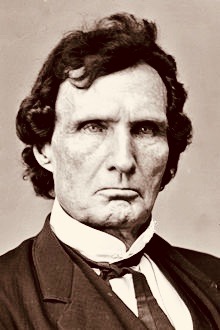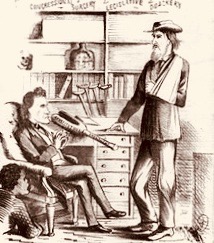Black History Month: Thaddeus Stevens

Thaddeus Stevens Speaks To The House
Steven Spielberg directs two-time Academy Award® winner Daniel Day-Lewis in “Lincoln,” a revealing drama that focuses on the 16th President’s tumultuous final months in office. In a nation divided by war and the strong winds of change, Lincoln pursues a course of action designed to end the war, unite the country and abolish slavery. With the moral courage and fierce determination to succeed, his choices during this critical moment will change the fate of generations to come.
 As a Republican, Thaddeus Stevens rose to become the chairman of the House Ways and Means Committee. During the American Civil War, this post made Stevens the most powerful member of the House of Representatives, responsible for designing and shepherding bills through the House that would both raise the funds for the war effort and authorize the immense expenditures required to fight it. Confederate troops under the command of Jubal Early destroyed one of Stevens’ remaining holdings in Adams County, the Caledonia Ironworks, on their march toward Gettysburg in late June 1863.
As a Republican, Thaddeus Stevens rose to become the chairman of the House Ways and Means Committee. During the American Civil War, this post made Stevens the most powerful member of the House of Representatives, responsible for designing and shepherding bills through the House that would both raise the funds for the war effort and authorize the immense expenditures required to fight it. Confederate troops under the command of Jubal Early destroyed one of Stevens’ remaining holdings in Adams County, the Caledonia Ironworks, on their march toward Gettysburg in late June 1863.
With the Civil War drawing to a close in January 1865, Thaddeus Stevens delivered the final speech during the debate of the Thirteenth Amendment to the Constitution of the United States. As the leader of the Radical Republicans, Stevens had pressed the issue of abolition throughout his time in Congress, and on Jan. 31 secured victory with the passage of the amendment.
Thaddeus Stevens and President Lincoln meeting in the cellar
After Lincoln’s death, Andrew Johnson rose to the presidency, and Thaddeus Stevens recognized him as an enemy. Within a year of Johnson assuming office, Stevens and the Radical Republicans had enough votes to override Johnson’s veto on a regular basis, beginning with the passage of the Civil Rights Bill of 1866. This conflict culminated in the impeachment of Andrew Johnson in 1868, during which Thaddeus Stevens served as one of seven members of the House that managed the impeachment proceedings. By this time, Stevens was physically weak to the point that he had to be carried through the Capitol on a chair. Johnson was acquitted in the U.S. Senate by one vote.
Perhaps Thaddeus Stevens’s greatest victory came as the father of the Fourteenth Amendment. The amendment, among its notable provisions, extended equal civil rights to former slaves. Stevens gathered the 2/3 vote needed in the House to pass the amendment in1868, which ensured birthright citizenship, as well as the protections of life, liberty, property and equal protection of the laws for all Americans. He compromised by accepting the amendment without a suffrage provision, but accomplished the majority of his mission. The sesquicentennial of the adoption of the Fourteenth Amendment will be commemorated in 2018 when the Thaddeus Stevens Society holds a July ceremony in Lancaster, where Thaddeus Stevens is also buried. To read more go to the link below:
https://www.gettysburgpa.gov/home/news/thaddeus-stevens-gettysburgs-most-prominent-resident

